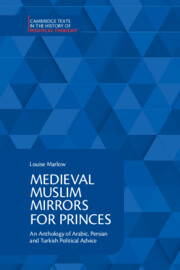Book contents
- Medieval Muslim Mirrors for Princes
- Cambridge Texts in the History of Political Thought
- Medieval Muslim Mirrors for Princes
- Copyright page
- Dedication
- Contents
- Figures and Maps
- Preface and Acknowledgements
- Conventions
- Abbreviations
- Part I Introduction
- Part II Texts
- 5 The Nature of Sovereignty
- 6 The King’s Person and Character
- 7 Foundations of Royal Authority and Principles of Governance
- 8 The Practice of Good Governance
- 9 Problems in the Kingdom and Their Remedies
- Appendix Index of Qurʾanic References and Quotations
- Glossary
- Bibliography
- Index
- Cambridge Texts in the History of Political Thought
8 - The Practice of Good Governance
from Part II - Texts
Published online by Cambridge University Press: 15 January 2023
- Medieval Muslim Mirrors for Princes
- Cambridge Texts in the History of Political Thought
- Medieval Muslim Mirrors for Princes
- Copyright page
- Dedication
- Contents
- Figures and Maps
- Preface and Acknowledgements
- Conventions
- Abbreviations
- Part I Introduction
- Part II Texts
- 5 The Nature of Sovereignty
- 6 The King’s Person and Character
- 7 Foundations of Royal Authority and Principles of Governance
- 8 The Practice of Good Governance
- 9 Problems in the Kingdom and Their Remedies
- Appendix Index of Qurʾanic References and Quotations
- Glossary
- Bibliography
- Index
- Cambridge Texts in the History of Political Thought
Summary
The selections in this chapter discuss the management of the realm and the importance of specific royal practices. Ensuring the prosperity of the rural and urban populations, the productivity of the land, the proper maintenance of the army and sound financial management feature prominently among the king’s responsibilities. Many mirrors emphasise the necessity of constant royal oversight, particularly of the officials involved in the collection of taxes. Strict and consistent oversight, accompanied by swift dismissal when cases of abuse came to light, were the only measures that would protect the revenue-producing categories on whose labour the entire edifice of government depended. In cases of injustice, it was the ruler’s obligation to provide a means of redress, through the practice of listening to the petitions of his subjects and restoring to them any property that had been wrongfully seized. In many instances, the practices of good governance urged upon the wise and virtuous ruler reflect the principle of maṣlaḥa, the common good. The texts are drawn from al-Māwardī, Tashīl al-naẓar wa-taʿjīl al-ẓafar; Niẓām al-Mulk, Siyar al-mulūk; and al-Ṭurṭūshī, Sirāj al-mulūk.
- Type
- Chapter
- Information
- Medieval Muslim Mirrors for PrincesAn Anthology of Arabic, Persian and Turkish Political Advice, pp. 216 - 258Publisher: Cambridge University PressPrint publication year: 2023
- 1
- Cited by

